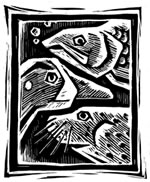- Home
- Restoration Projects
- Project Search
- HRM Program: Genomic mechanisms that underlie lack of recovery of PWS herring following the 1990s collapse 20170115 (1)
Project Information
Title: HRM Program: Genomic mechanisms that underlie lack of recovery of PWS herring following the 1990s collapse 20170115 (1)
Project Year and Number: 2020: 20170115
Other Fiscal Years and Numbers for this Project: 2021: 21170115, 2019: 19170115, 2018: 18170115, 2017: 17170115
Principal Investigator (PI): Andrew Whitehead (University of California Davis)
Managing Agency: USGS
Assisting Personnel: None
Project Website: https://pwssc.org/exposure-to-oil-limits-herring-fitness/
Research Location: Prince William Sound
Restoration Category: Research
Injured Resources Addressed: Pacific Herring
Abstract:The long-term health of fisheries is of crucial importance for the economic health of our coastal communities and for the food security of our nation. Therefore, the causes and consequences of changes in stock abundance merit careful scientific evaluation. The causes of the collapse of the Prince William Sound (PWS) Pacific herring stock are controversial, and the reasons for the lack of recovery remain a mystery. In the research proposed here we interrogate the genome structure and genome function of PWS fish to test hypotheses about the causes and consequences of the collapse, by revealing ecological, evolutionary, and genetic mechanisms governing the demographic trajectory of PWS fish over the past ~30 years. Conspicuous events that coincided with the dramatic PWS collapse include the Exxon Valdez oil spill (EVOS) four years previous, and the emergence of disease. We test hypotheses concerning the effects of oil exposure, the effects of disease challenge, and their potential interactive effects, on herring health and fitness. We will test predictions and hypotheses by reconstructing genome-wide genetic change through time (over the past 30 years) in PWS fish, and compare this to population genetic change through time in two reference site populations. Furthermore, a series of laboratory-based experiments will test for population differences in their response to oil exposure in early life and subsequent resilience to pathogen exposures. Physiological measurements and patterns of genome-wide gene expression will serve to reveal similarities and differences in mechanisms of response to these stressors between PWS and reference population fish. These studies should provide novel insights into the causes and consequences of recent dramatic demographic changes in PWS fish, potentially inform novel intervention strategies, and provide modern genomic resources for management and conservation of Pacific herring.
Proposal: View (252 KB)
Reports:
Annual Report: View (620 KB)
Final Report: See Project 21170115
Publications from this Project: None Available
